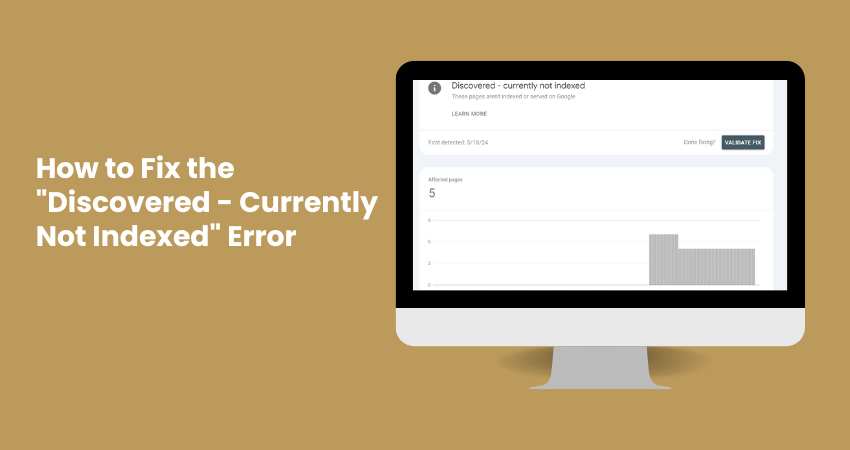If you’re a website owner or manager, you want your pages to appear on Google search results. However, sometimes you might see an error in Google Search Console that says “Discovered – currently not indexed.” This can be frustrating, but don’t worry!
This guide will walk you through this error and how to fix it in simple, easy-to-understand steps.
What Does “Discovered – Currently Not Indexed” Mean?
When Google crawls the web, it finds new pages and adds them to its list (or index) of pages to show in search results. If a page on your site shows “Discovered—currently not indexed,” it means Google has found your page but hasn’t yet added it to its index, meaning your page won’t appear in search results.
Why Does This Happen?
There are several reasons why your page might not be indexed:
- Crawl Budget Limits: Google allocates specific resources to crawl each website. If your site is large or has many new pages, Google might delay indexing some pages.
- Low-Quality Content: If Google thinks your content isn’t valuable or relevant, it might choose not to index it.
- Technical Issues: Problems like slow page load times, incorrect use of robots.txt, or other technical errors can prevent Google from indexing your page.
- Duplicate Content: If your page has content too similar to other pages, Google might decide it’s not worth indexing.
- New Pages: Sometimes, it just takes time. If your page is new, Google might need more time to index it.
How to Fix the Issue
Here are the steps to resolve the “Discovered – currently not indexed” error:
- Check Your Crawl Budget
- What to Do: Make sure your website’s crawl budget isn’t being exceeded. You can see how often Google crawls your site in the Google Search Console under “Settings” > “Crawl stats.”
- How to Fix: Optimize your site’s crawl efficiency. Ensure your site structure is logical, remove unnecessary or duplicate pages, and use internal linking to help Google find essential pages.
- Improve Content Quality
- What to Do: Ensure your content is unique, valuable, and relevant to your audience. Google prioritizes high-quality content.
- How to Fix: Add original, informative content to your pages. Avoid thin content (pages with very little information) and ensure your content is useful and engaging.
- Fix Technical Issues
- What to Do: Ensure no technical barriers prevent Google from indexing your page.
- How to Fix:
- Check Robots.txt: Ensure your robots.txt file isn’t blocking Google from crawling your pages. You can check this in the “Robots.txt Tester” tool in Google Search Console.
- Page Speed: Improve your page load times. Slow pages might not get indexed. Use tools like Google PageSpeed Insights to identify and fix issues.
- Mobile-Friendliness: Ensure your site is mobile-friendly. Google prioritizes mobile-optimized sites. You can test your site with Google’s Mobile-Friendly Test tool.
- Eliminate Duplicate Content
- What to Do: Ensure your content isn’t duplicated across multiple pages or sites.
- How to Fix: Use canonical tags to tell Google which version of a page is the preferred one. Consolidate similar pages and make sure each page has unique, valuable content.
- Request Indexing
- What to Do: Sometimes, you just need to nudge Google to index your page.
- How to Fix: In Google Search Console, go to the “URL Inspection” tool, enter the page URL you want indexed, and click “Request Indexing.”
- Build Quality Backlinks
- What to Do: Links from other websites can signal to Google that your page is valuable and worth indexing.
- How to Fix: Create high-quality content that others will want to link to. Reach out to other websites in your niche and build relationships to earn backlinks.
- Be Patient
- What to Do: Sometimes, indexing takes time, especially for new sites or pages.
- How to Fix: Continue monitoring your site in Google Search Console and improving your site and content. Over time, Google will likely index your pages.
Conclusion
The “Discovered – currently not indexed” error in Google Search Console can be frustrating, but with the proper steps, you can resolve it. Check your crawl budget, improve your content quality, fix technical issues, eliminate duplicate content, request indexing, build quality backlinks, and be patient. By following these steps, you’ll improve your chances of getting your pages indexed and appearing in Google search results.
